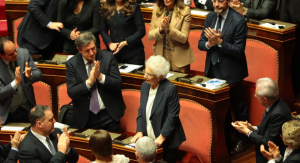NEWS Liliana Segre’s testimony: “I do not hate and thus I am free”
“I am ever so sorry to be ninety years old and not to have so many years to live. In spite of all my opponents, who constantly wish me dead, I would hate to die.” Senator Liliana Segre has dismissed with a smile those wasting their time on social networks wishing evil on or insulting her and has given a teaching to 2000 students who have gathered in Milan at Teatro Arcimboldi to listen to her speech. This appointment, organised by the Association Children of the Shoah and Corriere della Sera newspaper, has become nearly a tradition. While she was recounting her experience at Auschwitz camp, Segre declared that, all the same, people in the concentration camp “chose life.” “Life is a very important word which must not ever be forgotten as we can never go back,” underlined Segre receiving a standing ovation. “We must not waste a single minute of our life, which is extraordinary.”
The Minister for Education Lucia Azzolina also took part into the meeting, together with the honorary president of the Shoah Memorial Ferruccio De Bortoli. She promised Segre that, “They will escort her, all this school will proudly protect her from any revisionist or fascist backlash, any hate crime, in fulfilment of the Italian Constitution.” She then addressed the students, “Don’t ever underestimate the power of hate, turn what you hear into a tenet. Go home, process it and behave yourself accordingly.” The new minister promised that, “As ministry, we will ensure that you become active and conscious citizens,” after taking part into the Remembrance journey organised by MIUR in collaboration with UCEI.
In her speech. Segre traced back the history of her persecution, from the exclusion from her school because of the Italian Racial Laws in 1938 to her deportation to Auschwitz, together with her father, after being rejected at the border with Switzerland. Her father would later die in the camp, whereas she, a teenager, would survive until the liberation of Auschwitz. “I was filled with hatred and desire for vengeance. I would dream of revenge and when my jailer threw his gun at my feet, I thought I would kill him. I believed it would be a fitting finale for what I had suffered. It was a unique moment, but soon I understood I could never kill anybody. I did not pick up that gun and from that moment on, I have become the free woman keen on peacefulness that I am now”.
Translated by Mattia Stefani, student Advanced School of Modern Languages for Interpreting and Translation of Trieste University and intern at the newspaper office of the Union of the Italian Jewish Communities.

